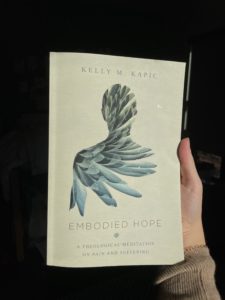No person lives without experiencing some form of suffering. Due to the fall, it is only natural that trials and tribulations of all sorts are prevalent in the world. But what is suffering? Some think of natural disasters, cancer, tragedies, and death, while others think of the more common ways we suffer, such as the discomfort we may feel when exercising. We have a day that is just a little bit harder than the one before and we think “I am suffering so much.” People tend to not take the time to stop and process how they are feeling and deal with it in a positive, biblical way.
 Unfortunately, modern Christians often view suffering through an intellectual lens, choosing to quickly push through or simply disregard it. They fail to see the importance of addressing what hurts us and lamenting over it if necessary; we just try to keep working and moving on because that is the American way. However, if you keep burning the candle at both ends without ever facing the pain in your life, then you and your candle quickly become burnt out. This is one of the reasons rest is so important.
Unfortunately, modern Christians often view suffering through an intellectual lens, choosing to quickly push through or simply disregard it. They fail to see the importance of addressing what hurts us and lamenting over it if necessary; we just try to keep working and moving on because that is the American way. However, if you keep burning the candle at both ends without ever facing the pain in your life, then you and your candle quickly become burnt out. This is one of the reasons rest is so important.
This past week was our first week back on campus post-Brazil. As fun as it was to see all of our friends and catch up with people when we got back, Monday morning we immediately jumped right back into the Fellows routine. And it was really, really hard. To go from living in Brazil, where we worked but also rested quite often, to our academic schedule where work and rest look very different, was a bit of a culture shock. Our first week back we had two quizzes, a reflection, and a five-page book review due, and many of us are also working on college applications, summer plans, and building intentional relationships. It felt in a way as if we did not have time to truly process returning back to the fast-paced lifestyle.
 A lot of students would consider the level of work and stress we had this last week “suffering,” so it was somewhat ironic that our book review was on Kelly M. Kapic’s Embodied Hope: A Theological Meditation on Pain and Suffering. Kapic’s main focus is not solving the problem of suffering or teaching one how to minimize pain in their life, but rather on how Christians should cope with suffering and understand its purpose. The book is “a theological and pastoral meditation” that is meant to benefit those who are hurting and those who are healing. Kapic explains that the issue is not one specific part of suffering that one must learn to deal with, but rather our struggle is “with how it affects us in our totality: from our relationships to our faith, from our bodies to our hope, from our mourning to our love.” He reminds us of the importance of relying on God during our suffering and remembering that God himself suffered as Jesus Christ on Earth.
A lot of students would consider the level of work and stress we had this last week “suffering,” so it was somewhat ironic that our book review was on Kelly M. Kapic’s Embodied Hope: A Theological Meditation on Pain and Suffering. Kapic’s main focus is not solving the problem of suffering or teaching one how to minimize pain in their life, but rather on how Christians should cope with suffering and understand its purpose. The book is “a theological and pastoral meditation” that is meant to benefit those who are hurting and those who are healing. Kapic explains that the issue is not one specific part of suffering that one must learn to deal with, but rather our struggle is “with how it affects us in our totality: from our relationships to our faith, from our bodies to our hope, from our mourning to our love.” He reminds us of the importance of relying on God during our suffering and remembering that God himself suffered as Jesus Christ on Earth.
At first, I had an incredibly hard time balancing all of our work, maintaining healthy community, and spending time with the Lord. I was stressed and burnt out within just a few days. However, I quickly found that so long as I was intentionally sitting with God every day, I was grounded and calm throughout the day. The more time I gave to God each day, the more time he provided for me to do what I needed to get done. By relying on the Lord in my suffering, I was able to not only rest in him but rest with friends and have a relatively stress-free week. I was able to enjoy friends I had not seen since pre-Brazil due to Covid, spend time in nature experiencing God’s glory, and I slept well! I know I could not have had such an easy week if I had not leaned on the Father in my suffering. The Lord works all things for our good, we just have to remember to rely on him when things get tough.
by Harper Beard
